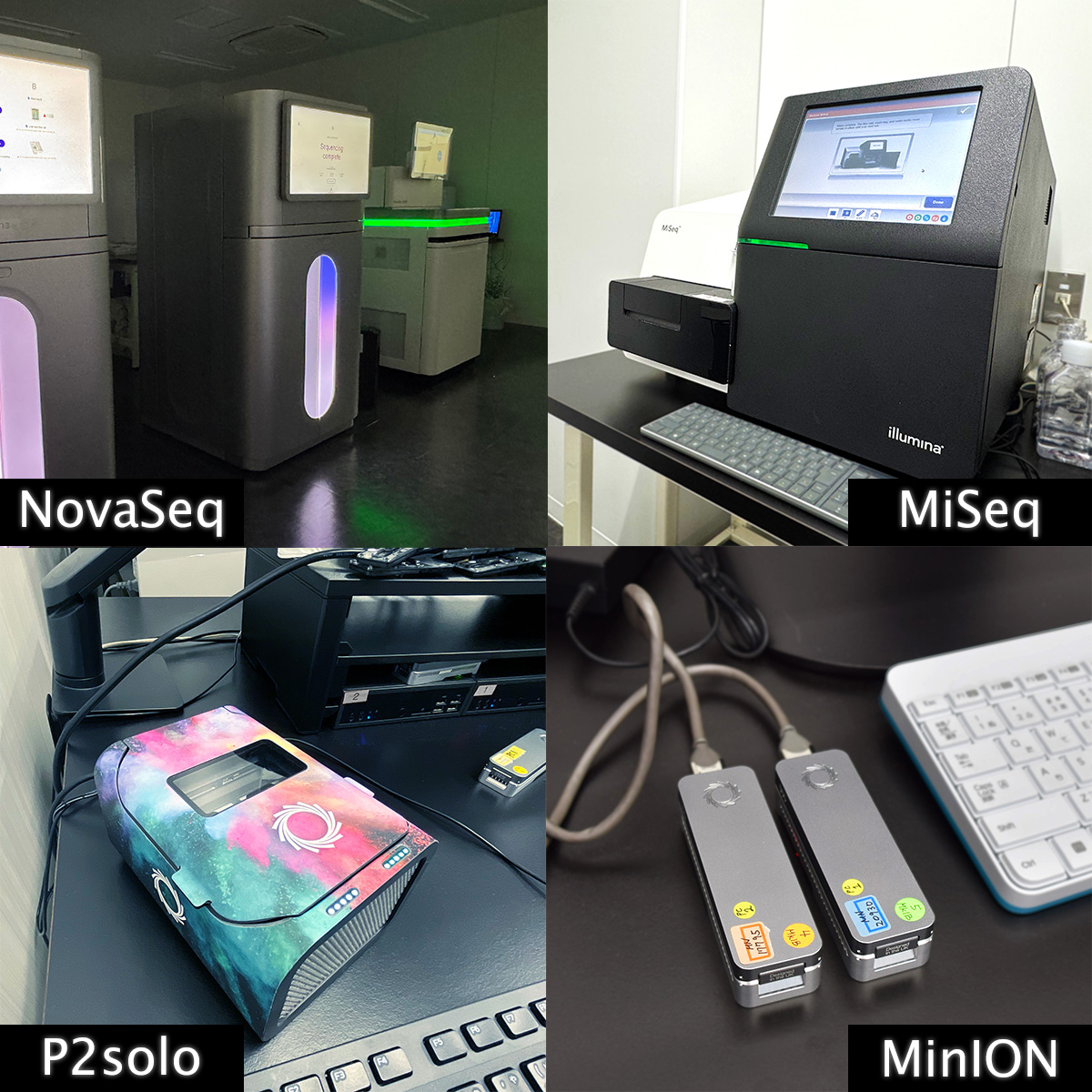Nakamura Lab/Bioinformatics Center Department of Infection Metagenomics
Next-generation sequencing (NGS) technology, which has been used in practice since around 2005, has led to a dramatic revolution in genome science and disease research. This technology enables the generation of vast amounts of genetic information in a short time and has uncovered the genomes of various model and non-model organisms. The Department of Infection Metagenomics works with specialist staff from the fields of microbiology, infectious diseases, and bioinformatics to conduct research on understanding pathogens and infectious diseases through genomic and metagenomic analyses using NGS technologies.
The evolution of NGS technology has been remarkable, leading to the successive development of new instruments with various characteristics (Fig. 1). The sole output of NGS technology is nucleic acid sequence data (i.e., sequences of the four bases: A, T, G, and C). Thus, skill in bioinformatics is necessary to determine its biological meaning. Additionally, selecting the appropriate technology and having diverse knowledge of microbiology, genomics, and computer programming is crucial. Experts in each field collaborate in our laboratory and make full use of the large-scale computing facilities for analyzing big data (Fig. 2).
There are many infectious diseases for which the molecular mechanisms responsible for their pathogenicity are unknown. We are analyzing the genomes of pathogens in an effort to uncover virulence factor genes to elucidate the molecular mechanisms underlying the pathogenesis of infectious diseases. Another scientific field that has shown great advancements due to NGS is metagenomics. This is the concept of treating the genomes derived from an assemblage of organisms recovered from the environment as a single sum. NGS technology has enabled the comprehensive analysis of genomes from large populations of organisms. For example, if the microbial genomes in blood were comprehensively analyzed, it would be possible to identify the pathogen responsible for a disease of unknown cause and the genes responsible for its virulence. Unlike conventional methods, this technique detects any pathogen and can be adapted to various clinical samples, including blood, nasal, and stool specimens. Our laboratory aims to establish strategies for detecting and identifying pathogens using this metagenomic approach.
One of our research goals is to understand the symbiotic microbiota of humans. Humans live in symbiosis with many different microorganisms inside and outside the body. Thus, the human body can be considered a superorganism. The gut microbiota typically plays a vital role in various diseases. Our laboratory performs metagenomic analyses of the gut microbiota during the onset of various diseases to investigate the dynamics of the microbiota and its recovery. We also study diarrheal diseases to understand the triadic relationship between humans, gut bacteria, and pathogens. Furthermore, we use a structural biology approach to investigate how pathogenic microorganisms attach to and live in the intestinal tract (colonization) and cause diseases. We aim to develop new therapeutic alternatives to antibiotics by understanding and inhibiting the mechanism of intestinal colonization.
Research Theme
1. Understanding pathogenic mechanisms using genomic analysis
2. Understanding symbiotic microbiota using metagenomic analysis
3. Structural analysis of virulence factors
4. Development of bioinformatics software tools
5. Development of new methodologies based on NGS technologies
Staff
- Assoc. Prof.: Shota Nakamura
- Prof.: Tetsuya Iida (concur.)
- Prof.: Takayuki Kato (concur.)
- Assoc. Prof.: Daisuke Motooka (concur.)
- Asst. Prof.: Kiyoharu Fukushima (concur.)
- SA Asst. Prof.: Yuki Matsumoto
- SA Asst. Prof.: Hiroya Oki
- JSPS Postdoc.: Yuko Imamura
Website
Publications
1. Variability of macrolide-resistant profile in Mycobacterium avium complex pulmonary disease. Fukushima K et al., Antimicrob Agents Chemother. (2024) 68(11):e0121324
2. Turicibacter faecis sp. nov., isolated from faeces of heart failure mouse model. Imamura Y et al., Int J Syst Evol Microbiol. (2024) 74(5):006379
3. Non-tuberculosis Mycobacterial Pulmonary Disease Caused by Mycobacterium kiyosense, a New Species. Yamada K et al., Intern Med. (2024) 63(13):1913-1916
4. MGIT-seq for the Identification of Nontuberculous Mycobacteria and Drug Resistance: a Prospective Study. Fukushima K et al., J Clin Microbiol. (2023) 61(4):e0162622
5. Structural basis for the toxin-coregulated pilus-dependent secretion of Vibrio cholerae colonization factor. Sci Adv. Oki H et al., (2022) 8(41):eabo3013
6. Longitudinal alterations of the gut mycobiota and microbiota on COVID-19 severity. Maeda Y et al., BMC Infect Dis. (2022) 22(1):572
7. Mycobacterium senriense sp. nov., a slowly growing, non-scotochromogenic species, isolated from sputum of an elderly man. Abe Y et al., (2022) Int J Syst Evol Microbiol. 72(5)
8. Benchmark of 16S rRNA gene amplicon sequencing using Japanese gut microbiome data from the V1-V2 and V3-V4 primer sets. Kameoka S et al., BMC Genomics. (2011) 22(1):527
9. Comprehensive subspecies identification of 175 nontuberculous mycobacteria species based on 7547 genomic profiles. Matsumoto Y et al., Emerg Microbes Infect. (2019) 8(1):1043-1053
10. Interplay of a secreted protein with type IVb pilus for efficient enterotoxigenic Escherichia coli colonization. Oki H et al., Proc Natl Acad Sci. (2018) 115(28):7422-7427
- Home
- Laboratories
- Nakamura Lab









